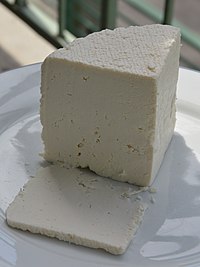Urda (cheese)
| Urdă | |
|---|---|
 | |
| Other names | Orda, Zsendice |
| Country of origin | Romania, Macedonia, Bulgaria, Serbia, Hungary, Ukraine |
| Source of milk | Cow Sheep Goat |
| Pasteurized | Traditionally, no |
| Texture | Fresh |
Urdă[1] (Romanian pronunciation: [ˈurdə], Macedonian: урда, urda, Bulgarian: урда, извара, Serbian: вурда, vurda, Ukrainian: вурда, Hungarian: orda, zsendice) is a sort of whey cheese common in the Balkans, variously claimed to be Romanian,[2] Serbian,[3] Macedonian[2][4][5] and Hungarian.[6] It is made from whey of sheep, goat or cow milk. Urdă is produced by heating the whey resulting from the draining of any type of cheese. It is often made into molds to the shape of a half sphere. The paste is finely grained, silky and palatable. It contains 18 grams of protein per 100 grams.
In Romania, urdă is traditionally used in the preparation of several desserts, such as as clătită and plăcintă. Urda is also traditionally prepared in Serbia, notably in the southern region of Pirot.
Urdă is similar to Ricotta in the way it is produced.
References
- ^ "Definition of urdă" (in Romanian). DEX on line.Template:Source need translation
- ^ a b Alan Davidson. The Oxford Companion to Food. Oxford: Oxford University Press. p. 684.
- ^ Tehnologija hrane (Serbian)Template:Source need translation
- ^ About the Macedonian gastronomy (Macedonian)
- ^ Urda - super food for the health and beauty (Macedonian)Template:Source need translation
- ^ Zsendice vagy orda (Hungarian)Template:Source need translation
